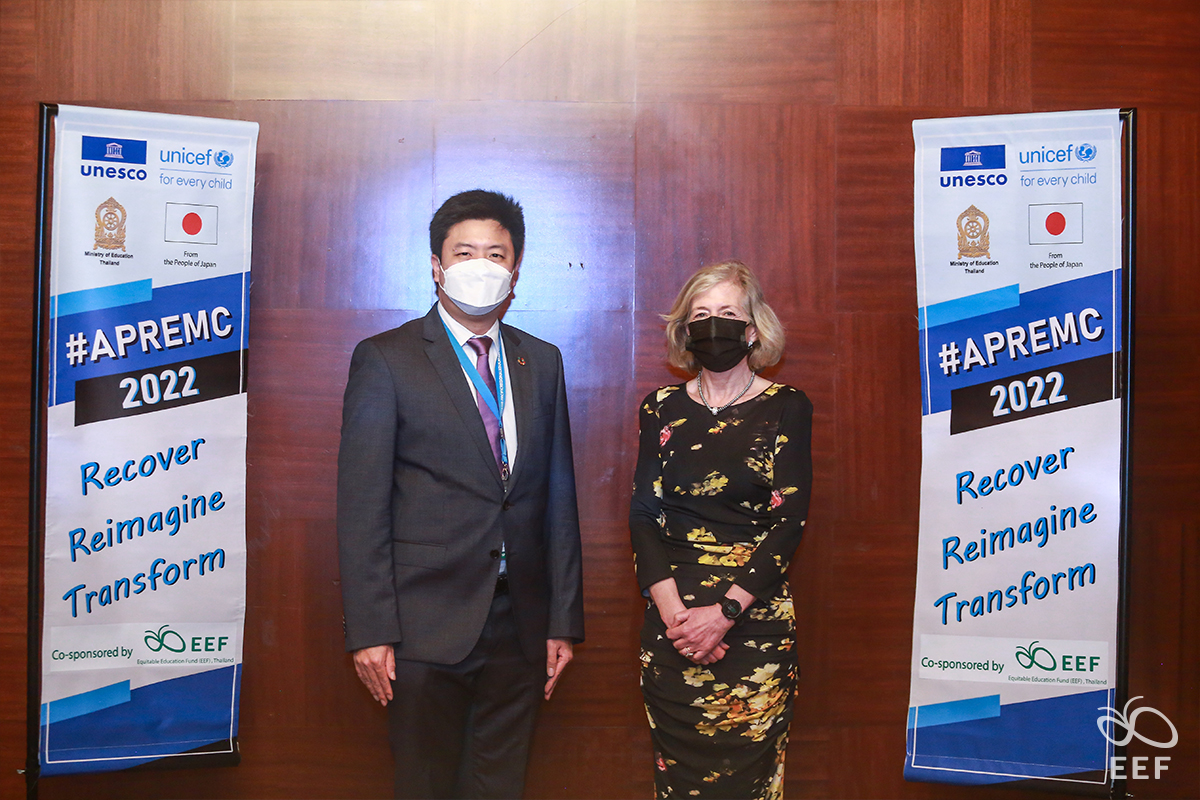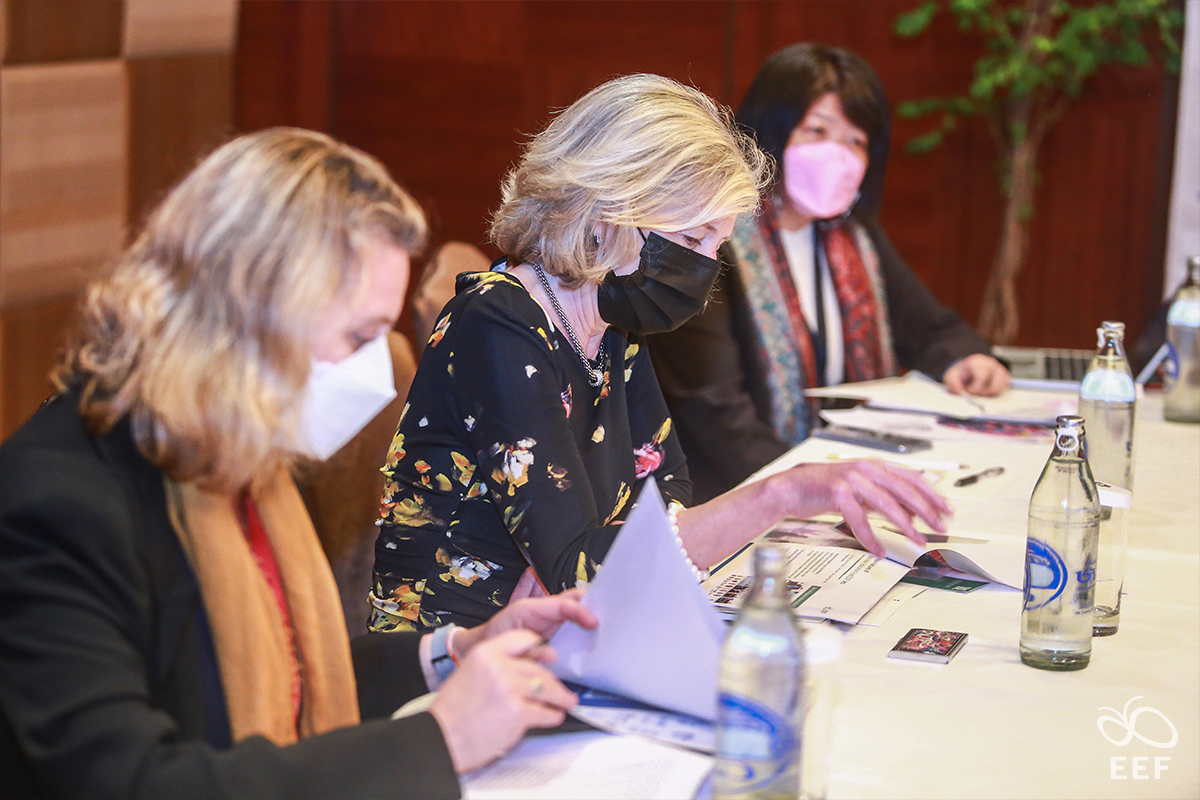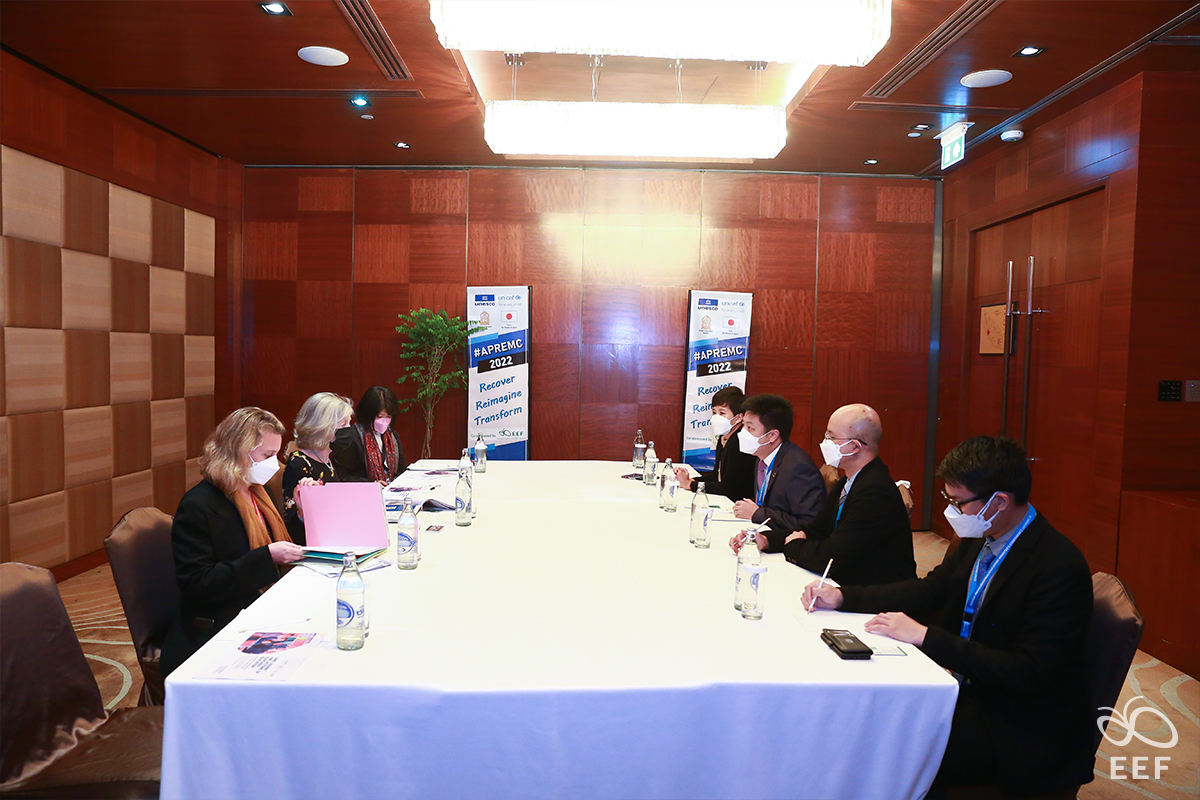
—Top education officials from the United Nations Educational, Scientific and Cultural Organization (UNESCO) and Thailand’s Equitable Education Fund (EEF) have reaffirmed their commitment to innovative financing and international cooperation for equitable education.—
UNESCO Assistant Director-General for Education Stephania Giannini and EEF Managing Director Dr Kraiyos Patrawart met together while attending official proceedings of the 2nd Asia-Pacific Regional Education Minister’s Conference (APREMC-II) in Bangkok (5 through 7 June), to reaffirm their partnership in the current, post-COVID-19 period of ‘education recovery and transformation’ in Asia and the Pacific.
Dr Patrawart highlighted the role of current EEF assistance for the education of the last 10 per cent of the most vulnerable children in Thailand, commenting, ‘Inequality has been persistent in Thai society, [thus] we try to convince the Thai government that equitable education is key to resolving intergenerational poverty’.
EEF was established under Thailand’s Equitable Education Act of 2018, with an aim to reducing education inequality through research, teacher development and direct financial support for children and youth in need. EEF’s management is independent of the Thailand Ministry of Education and reports directly to the prime minister.

In addition to providing tax incentives for private in-cash donations and in-kind contributions, one of the key strengths of the equity-focused public fund is its range of financing models. Many Thailand-based companies are funding EEF as part of their corporate social responsibility programmes, while EEF is negotiating with national regulators on making the procedures for resource mobilization as efficient, timely, and effective as possible.
EEF notes that issuance of corporate bonds for out-of-school children has recently proven to be a big success. In one such case, bonds issued by a property developer were sold out in two minutes and raised THB100 million (US$28.96 million).
Commenting on this development as well as the larger EEF mechanisms as a whole, Ms Giannini noted, ‘For education, as far as I know, I don’t think there is something similar, and it’s an interesting model. I repeated many times during the first day of the working session [of APREMC-II] that UNESCO is very much engaged in the upcoming United Nations Transforming Education Summit in September, and one of the pillars of our engagement is about financing education. This [EEF] mechanism is very innovative, in my opinion, and it could be interesting to explore how we can be part of this discussion’ moving forwards’.
Another innovative financing model that EEF recently undertook with a private partner was the joint operation of a ‘virtual’ run for which the partner donated THB250 to EEF for every kilometre people run. Runners wracked up an impressive 600,000 kilometres, collectively raising THB150 million over the course of only six days.
EEF works closely with about 30,000 Thailand schools under the supervision of 30 agencies, primarily the Thailand Ministry of Education, as well as the Ministry of Interior and the Royal Thai Police, among others, namely by providing cash transfers (i.e. providing cash assistance to those who satisfy certain qualifying conditions) to needy students directly through their schools.
EEF currently supports conditional cash transfers to about 1.3 million extremely poor children across Thailand to help prevent them from dropping out of school. EEF also supports UNESCO Bangkok’s ‘Learning Coin Project’, which promotes good learning habits through reading via a bespoke mobile application, LearnBig. ‘Learning Coin’ provides cash transfers for disadvantaged children based on their closely tracked reading efforts through the LearnBig app, ultimately enabling children and youth to continue their studies while contributing to the economic well-being of their families.
Ms Rika Yorozu, Head of Executive Office, UNESCO Bangkok, noted, ‘UNESCO and EEF have been strongly partnering in recent years, and the collaboration is very relevant…we certainly want to continue to work with EEF to document the process and to share lessons learned’.

Also present from EEF were Dr Pumsaran Tongliemnak, Acting Director of the Equitable Education Research Institute, Ms Thantida Wongprasong, Director of Office of Partnership, Innovation and Scholarships, and Mr Tanaphat Sirikulvadhana, Strategic Partnership and Fundraising’s Senior Department Manager. In addition to Ms Giannini and Ms Yorozu, UNESCO was further represented by Ms Jennifer Dajczman, Executive Assistant to the Assistant Director-General.
Ms Giannini pointed out that EEF’s experience and innovative financing models should be presented internationally, and she would like to consider how EEF’s models could be replicated or adapted to different contexts of not only the Asia-Pacific region, but perhaps the world.
Dr Patrawart also expressed EEF’s enduring enthusiasm to connect and learn from other countries in the region during an international conference like APREMC-II, which it was co-sponsoring. EEF has also been expanding its Equitable Education Alliance (EEA) network, an international community of equitable education practitioners, in which it is a founding member together with UNESCO.
‘We will keep expanding, Dr Patrawat commented, ‘and I believe that it will be a public good for the global initiative SDG4 and SDG17. If we are to achieve education for all, we need all for education. We will try to use this motto to promote collaboration with anyone in Thailand or in the international community’.

